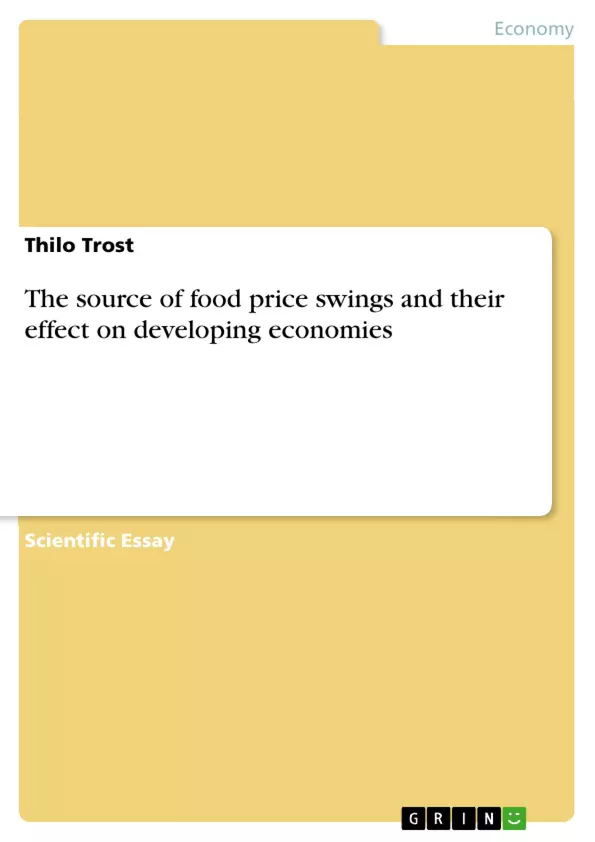In the following short paper, I am going to evaluate the economic effects of food price swings on emerging and developing economies. In recent years, we witnessed enormous increases and volatilities in commodity and especially food prices. Concerns of starvation are therefore strengthening. These economies tend to have a high percentage of food in their standardized consumption basket, which means they spend more of their income on food in general. Since food is an essential good of living, the recent price developments over the past ten years are threatening the social stability of these economies as well as the well-being of their inhabitants. In contrast to developed economies, the population of these relatively “poor” economies is facing enormous problems feeding themselves and their children.
This paper antends to give an answer to the extend of the pass-through effects of price increases to developing economies and the driving effects of those prices.
In the first part of the paper I am going to give a short overview over recent price developments, then discuss the topic of influential factors on these prices, especially the extend which speculation has on aforementioned price in- and decreases.
In the second part, I am going to eruate the pass-through effects of world food prices to developing economies as shown in the autumn study of the international monetary fund (hereinafter mentioned as IMF), namely what effect a 5% increase of food prices on international trade markets has on these economies, especially their output gap, and the foreign exchange value of the currency. The question to evaluate will not only be how price developments are
created but also how they influence the economies and social stability of developing countries.
Inhaltsverzeichnis (Table of Contents)
- Introduction
- Food price swings
- Influence Factors to world market prices
- Influence factors to domestic prices in developing economies – the pass-through effects
- A five percent price increase and the effects
- Conclusion
Zielsetzung und Themenschwerpunkte (Objectives and Key Themes)
This paper examines the economic impact of food price swings on emerging and developing economies. It aims to analyze the factors contributing to these price fluctuations and evaluate the pass-through effects on developing countries. The paper emphasizes the vulnerabilities of these economies due to their high reliance on food imports and the consequences for social stability and well-being.
- Impact of food price swings on developing economies
- Factors influencing global food prices
- Pass-through effects of global food price changes on domestic prices in developing economies
- Consequences of price increases for social stability and well-being in developing countries
- Role of speculation and demand pressures in emerging markets on food price fluctuations
Zusammenfassung der Kapitel (Chapter Summaries)
- Introduction: This chapter sets the stage for the paper by highlighting the increasing volatility of food prices and their implications for developing economies. It underscores the importance of understanding these fluctuations and their impact on social and economic stability.
- Food price swings: This chapter examines the recent volatility in food prices, using wheat and rice as examples. It highlights the dramatic price increases and subsequent declines, drawing attention to the potential for further fluctuations.
- Influence Factors to world market prices: This chapter explores factors influencing global food prices. It discusses the role of key producers, such as Russia in the wheat market, and highlights how events like droughts and trade embargoes can significantly impact prices. The chapter also explores other factors like global warming, demand pressures in emerging markets, and biofuel production.
Schlüsselwörter (Keywords)
The main keywords of this paper are food price volatility, developing economies, pass-through effects, global food markets, speculation, demand pressures, emerging markets, biofuels, and social stability.
- Quote paper
- Thilo Trost (Author), 2012, The source of food price swings and their effect on developing economies, Munich, GRIN Verlag, https://www.grin.com/document/190661



